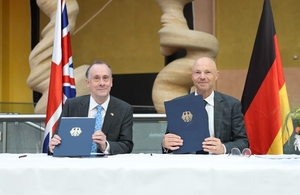 A new agreement between the UK and Germany could help to accelerate the development of an international hydrogen industry and the creation of a viable marketplace for it, as both an energy source and as a means to store energy. Representatives of the two governments have signed a Joint Declaration of Intent that will see with ‘the two countries at the cutting edge of its development, the UK and Germany’ work together to underpin the international trade in hydrogen.
A new agreement between the UK and Germany could help to accelerate the development of an international hydrogen industry and the creation of a viable marketplace for it, as both an energy source and as a means to store energy. Representatives of the two governments have signed a Joint Declaration of Intent that will see with ‘the two countries at the cutting edge of its development, the UK and Germany’ work together to underpin the international trade in hydrogen.
The partnership follows significant investment by both countries in the development of hydrogen as an alternative fuel. In the UK, the government is supporting new low-carbon hydrogen production with capital from the £240 million Net Zero Hydrogen Fund and revenue support from the Hydrogen Production Business Model. In Germany, the government is supporting the implementation of the National Hydrogen Strategy with funding from the Climate and Transformation Fund, providing a push for the ramp-up of a hydrogen market.
The plan is to “establish an industrial hydrogen market based on the model of the British offshore wind industry,” the federal foreign trade agency Germany Trade and Invest (GTAI) said in a report by news agency dpa published in business daily Handelsblatt. Hydrogen could also be exported to the EU. Currently, most of the hydrogen already used in Germany is imported. The UK made the expansion of renewable energy part of a national hydrogen strategy unveiled two years ago.
Several German business delegations have travelled to Scotland in recent months. “There are high hopes, especially in Scotland, that the direct export of hydrogen to the EU could not only open up lucrative sources of income, but also accelerate the transition from fossil fuels,” the Handelsblatt article said. Support has come from renewable energy proponents in Germany, who have called for greater domestic production of green hydrogen in order to scale up Germany’s hydrogen economy, andreduce the country’s dependence on costly imports, while political leaders in Scotland are said to support hydrogen deliveries to Germany.
Five pillars of the collaboration have been agreed.
- Accelerating the deployment of hydrogen projects for industry and consumers;
- Establishing international leadership on hydrogen markets, setting safety and regulations to aid trade;
- Research and innovation on hydrogen, from production to end use;
- Promoting trade for hydrogen, plus related goods, technologies and services;
- Joint market analysis, to support planning and investment by government and industry.
Image: UK's Minister for Energy Efficiency and Green Finance, Lord Callanan, and Germany's State Secretary for Energy, Philip Nimmermann, sign the Joint Declaration of Intent (courtesy of UK Government)

